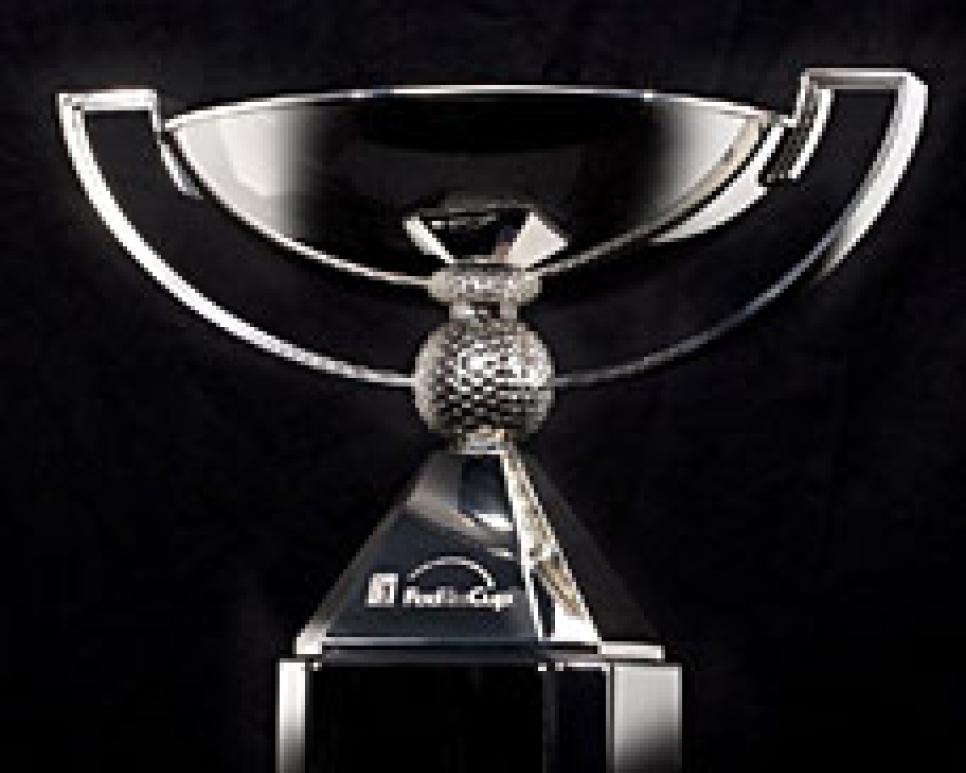News
Giving The FedEx Cup A Chance

The results from The Barclays are in, but the verdict on the PGA Tour playoffs for the FedEx Cup -- despite Tiger Woods' absence and Steve Stricker's heartwarming victory last week -- is not. While driving home from the tournament Friday, I heard National Public Radio's Robert Siegel tease an unlikely story on "All Things Considered." "Coming up, grumbling in the game of golf," Siegel said, his voice far more mellifluous than the reaction to the theme and the particulars of the inaugural FedEx Cup.
As sure as Woods is a lock with a lead, the PGA Tour has a tendency to overreach in its promotions, to commit the marketing equivalent of going for a 245-yard par 3 with a 7-iron, and they have been guilty beyond a reasonable doubt when it comes to the FedEx Cup. Yes, some of the television commercials have been clever, but the drumbeat has been relentless. "After a while," Vijay Singh admitted last week, "we just don't want to hear about it." The Barclays was a New York minute in a game that enjoys measuring itself with an hourglass the size of John Daly. It was a reminder that golf's best story lines flow from compelling players and dramatic play, not necessarily by public relations department order.
The arrival of the four faux post-season events brought with it the realization that the points competition is something between an awkward cash grab and meaningful incentive to enliven the post-PGA Championship part of the schedule. "People said the Tour Championship wasn't exciting. Tiger and Phil [Mickelson] weren't playing," said Davis Love III, a player director on the PGA Tour policy board. "We wanted to make it more exciting for TV and the fans, and we have. Guys are playing the same tournaments, just for a lot more money."
There were some grateful overtures last week. Singh admitted the $7 million purses fir each event, not to mention the $10 million annuity to the playoff victor, was a bounty unimaginable to earlier generations of pros. "You go back 30, 40 years, give the same opportunites to the guys that were playing then, they [would] swim to the tournaments," Singh said. "I think it's a great thing we have."
Aside from extra graphics on the CBS telecast and additional places to click on pgatour.com, the event felt much like the dozens of previous tournaments held at Westchester CC. "There was maybe a little extra excitement Wednesday or Thursday, but it sounded like a Nationwide Tour event out there today," Scott Verplank said Sunday. "It was quiet, as quiet as I've ever seen it. But I think you've got to give [the idea] a chance. The field was great, except for Tiger not coming, and the field will be great next week. They will try to work the kinks out of it, and it will probably be a plus for the tour."
I left Westchester CC hoping the playoffs will pick up momentum the way Stricker did in the final round, making birdie on four of the final five holes. "I think the feel is going to get progressively tighter and and different as the next couple of weeks go on," said Masters champion Zach Johnson. Only two golfers outside the top 120 last week managed to play their way into this week's Deutsche Bank Championship. Rich Beem (T-7) vaulted from 134th to 113th and Doug LaBelle II (T-41) nudged upward from 121st to secure the last spot. LaBelle birdied the 72nd hole, but his fate wasn't known for hours. The potential for various subplots has been a talking point for the tour, but LaBelle's status in the playoff landscape was like a micro-climate few felt.
Players were peppered with questions, which elicited some candid and thoughtful responses. "I think in our sport 'playoff' is a very loosely used word," said Jim Furyk. "It is an end-of-the-season chase." Said Love, "We need to be careful about what we call it. I think 'playoffs' may have been overhyped. It's still the individual tournaments. [The tour] is a big machine. We work so hard to build things up, we have to make sure we don't lose anything."
Many of his peers defended Woods' absence, but Jeff Maggert suggested, "If you pull out of a tournament, you're pulling out of the playoffs. Obviously a lot of players aren't going to like that rule, but if you want to promote the playoffs as 'the playoffs,' some of the rules are going to have to be different." As it is, golfers will jockey for position the first three weeks, but Maggert would make the 30-man Tour Championship an equal-opportunity affair. "Everyone [with] the same amount of points -- that's the Super Bowl of golf," he said. The tour will not get a second chance to make a first impression, but it is open to adjustments after 2007. "Anything can change. That's the great thing about it," Love said. "Nothing is in stone."
The FedEx Cup playoffs were designed as a double espresso for a part of the season that had grown increasingly drowsy. The jolt has had an effect, but its lasting influence is unclear.

.jpg)